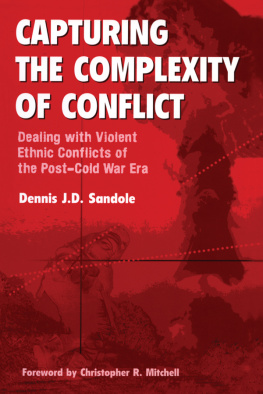ISRAELI SOCIETY AND ITS DEFENSE ESTABLISHMENT
The Social and Political Impact of a Protracted Violent Conflict
ISRAELI SOCIETY AND ITS DEFENSE ESTABLISHMENT
The Social and Political Impact of a Protracted Violent Conflict
Edited by
Moshe Lissak
First published 1984 by
FRANK CASS AND COMPANY LIMITED
Published 2013 by Routledge
2 Park Square, Milton Park, Abingdon, Oxon OX14 4RN
711 Third Avenue, New York, NY, 10017, USA
Routledge is an imprint of the Taylor & Francis Group, an informa business
Copyright 1984 Frank Cass & Co. Ltd.
British Library Cataloguing in Publication Data
Israeli society and its defense establishment.
1. Jewish-Arab relations1949-
2. IsraelSocial conditions
I. Lissak, Moshe
956.04 DS119.7
ISBN 13: 978-0-714-63235-3 (hbk)
This group of studies first appeared in a Special Issue on Israeli Society and its Defense Establishment of The Journal of Strategic Studies Vol. 6, No.3 published by Frank Cass & Co. Ltd.
All rights reserved. No part of this publication may be reproduced, stored in a retrieval system, or transmitted in any form, or by any means, electronic, mechanical, photocopying, recording, or otherwise, without the prior permission of the publisher.
Contents
Moshe Lissak |
Baruch Kimmerling |
Yoram Peri |
Haim Benjamini |
Dan Horowitz |
Alex Mintz |
Victor Azarya and Baruch Kimmerling |
Moshe Lissak is now Professor of Sociology at the Hebrew University, Jerusalem, and was a research fellow at the Center for International Affairs, Harvard University and at St Antonys College, Oxford. He has written extensively on civil-military relations in developing societies and in Israel; and on politics and social problems in Israel. He is Editor of Megamot (Behavioral Sciences Quarterly in Hebrew), and his publications include Social Mobility in Israeli Society (1969), Military Roles in Modernization: Civil-Military in Thailand and Burma (1976), and Origins of the Israeli Polity: Palestine Under the Mandate (1978), with Dan Horowitz.
Baruch Kimmerling is a Senior Lecturer of the Department of Sociology and Social Anthropology at The Hebrew University of Jerusalem. He has published extensively in the field of sociology concerning the Zionist movement, the Jewish-Arab conflict, the military and war, as well as on social change and modernization. Among his publications are Zionism and Territory: The Socioterritorial Dimensions of Zionist Politics (Berkeley, 1983) and Zionism and Economy (Cambridge, Mass., 1983).
Yoram Peri is a Lecturer in Political Science at Tel Aviv University and a political analyst for Davar. His articles have appeared in The Jerusalem Quarterly and International Political Science and a recent publication is Between Battles and Ballots. Israeli Military in Politics (1982), published by Cambridge University Press.
Haim Benjamini (Brigadier General, retired) is Vice President of Human Resources and Organization Scitex Corporation and received his B. A. degree from The Hebrew University of Jerusalem and his M.A. from the University of Chicago.
Dan Horowitz is Associate Professor of Political Science and Sociology at The Hebrew University, Jerusalem, and was a Simon Fellow at the University of Manchester and Visiting Associate Professor at the Department of Political Science, University of Michigan (Ann Arbor). He was Director of the Leonard Davis Institute for International Relations, Hebrew University, until 1983, and is the author of numerous articles dealing with the Israeli-Arab conflict and Israeli concept of National Security, and the political structure of Israel. Among his publications are the The Israeli Army (1975) with Edward Luttwak, and Origins of the Israeli Polity: Palestine Under the Mandate (1978), with Moshe Lissak.
Alex Mintz is Lecturer at the Department of Political Science, The Hebrew University, Jerusalem, and received his Ph.D. from Northwestern University in 1981. His main interest is in the politics of resource allocation for military affairs and the military-industrial complex. He was a research associate in the US Defense Department, Advanced Projects Agency and research fellow in the Center of the Study of Science and Technology, Northwestern University. He has written several articles and a forthcoming book on The Politics of Resource Allocation in the United States Department of Defense.
Victor Azarya is Senior Lecturer in Sociology and Social Anthropology at The Hebrew University of Jerusalem. In addition to his interest in military sociology, he has conducted research on urban communities and on Third World countries. His publications on these subjects include two books, Aristocrats Facing Change (University of Chicago Press, 1978) and The Armenian Quarter of Jerusalem: Urban Life Behind Monastery Walls (University of California, 1983) and numerous articles and monographs. In the field of military sociology, his publications include Civic Education in the Israeli Armed Forces in The Political Education of Soldiers, edited by Morris Janowitz and Stephen D. Westbrook (Sage, 1983) and an earlier joint article with Baruch Kimmerling, New Immigrants in the Israeli Armed Forces (Armed Forces and Society, Vol. 6, No. 3, Spring 1980). He is currently engaged in further research on civic education and on special groups in the Israeli military.
Israel was born in war thirty-five years ago, and is still in the midst of a protracted violent conflict with some of its Arab neighbors. Earlier in history, violent clashes between the Jewish community in Palestine and the local Arab population were a frequent phenomenon. Thus, it was quite early in the development of the Jewish community in Palestine that the political leadership had to be concerned with the proper relationship between civilians and the cadre of men of arms that emerged in the twenties and thirties. Later, after the establishment of the state, the role and status of the growing defense establishment became a central issue in political life, especially in the wake of wars.
During the years, the relationship between the civilian sectors and the Defense Establishment acquired a special configuration, some of whose attributes are common to other democratic countries and some of which are peculiar to the Israeli case.
In this volume, the reader will find seven papers which deal with a broad spectrum of issues not necessarily confined to civil-military relations in their more limited and narrow definition. One will also find reference to the broader issues of the social, economic and political impact of the protracted violent conflict on Israeli society. This is elaborated by Kimmerling, whose paper analyzes the major effects of the perpetual external conflict on the social fabric of Israeli society. The major conclusion of this paper is that, by trial and error, Israel developed an ability to divide the area of conflict management into two dimensions: (a) institutional and mental compartmentalization between the civil and military areas; and (b) differentiation in the time dimensions of the periods of total mobilization and of the intervals between them in order to cope with security problems.






